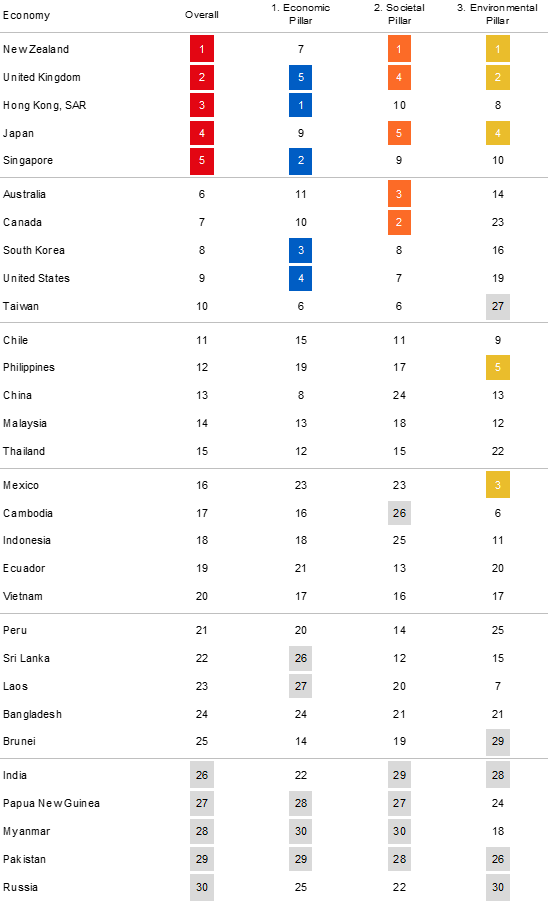IMD’s World Competitiveness Center (WCC) has added sustainable trade to the various facets of competitiveness it measures with a new ranking: the Hinrich-IMD Sustainable Trade Index.
“There is a massive trade off between globalization and sustainability,” said Professor Arturo Bris, Director of the WCC. “On the one hand, there is a social and environmental cost to being at the centre of trade; on the other, if you really want to play the sustainability card, you need to shut down your borders. In this sense, sustainability is creating huge dilemmas which we absolutely have to recognize.”
In the publicly available index – the fruit of a new partnership with the Singapore-based Hinrich Foundation – New Zealand ranks first, the UK second and Hong Kong third.
New Zealand tops the measure for political stability, ranks third in labor standards, and strongly upholds freedom of association and assembly. The UK ranks second partly because it keeps its energy intensity low, just as it does its percentage of wastewater treated, CO2 emission transfers and carbon management.
Hong Kong excels in attracting capital from foreign investors and maintaining a well-developed technological infrastructure.
The content of the index will appeal to regulators, businesses, and communities alike in helping to shape policies that integrate sustainably conducted trade into the prosperity of economies.
Supporting national economies while preserving global ESG objectives
Commonalities among high-performing economies were as wide-ranging as: a tendency to encourage technological innovation, low trade barriers, high life expectancy, good (prolonged) school attendance rates, impressive energy conservation at home, and a fervent respect for climate goals.
However, New Zealand, the UK, and Japan (which ranked fourth) all share a major weakness: their ecological footprint. Renewable energy is also a significant shortcoming in the performances of the UK and Japan.
Christos Cabolis, Chief Economist at the WCC, said: “International trade is a fundamental component of value creation, and therefore of the economic growth of countries that participate in it. Even though business leaders have shifted their focus to more company-specific operational challenges, the interdependency and interconnectedness of economies with respect to the flow of goods, services, people, capital, and ideas continues to be strong – and, therefore, the importance of sustainability in its widest sense remains high.
“Sustainable trade must be a focus of public decision makers navigating their countries’ strategies while striving to reach the United Nations Sustainable Development Goals for 2030.”
However, with inflation increasing and growth slowing, the index also partially reflects the relatively high tariff and non-tariff barriers to trade and their effects on the world’s biggest economies, including China (13th) and the US (ninth).
“The findings are a sobering indication of how the appetite of developed economies is driving forced labor, often more than we imagine. We hope they rally our wider policy, business, and academic communities to discuss solutions. We need to know more about our supply chains,” said Chuin Wei Yap, Program Director, International Trade Research at the Hinrich Foundation.
Previous editions of the STI covered 19 Asian economies and used the US as a benchmark.
The 2022 remodeling includes the Asia-Pacific Economic Cooperation (APEC) members Canada, Chile, Mexico, Peru, Russia, and the US, but also applicants for membership of the Comprehensive and Progressive Agreement for Trans-Pacific Partnership (CPTPP) – Ecuador and the UK. Four more economies are included due to their large regional presence: Bangladesh, India, Pakistan and Sri Lanka.
Apart from widening the pool of economies studied, the WCC has drawn upon its expertise in identifying and handling a wide range of external data to revamp the methodology and increase the number of data points studied. The index is structured around three key pillars – economic, social and environmental – which are designed to correspond to the most salient effects of global trade.
The Hinrich Foundation is a philanthropic organization that works to advance mutually beneficial and sustainable global trade. It supports original research and education programs that build understanding and leadership in global trade. A combination of the Foundation and the WCC’s complimentary skills and heritage, the Hinrich-IMD Sustainable Trade Index will now be released annually.
The WCC’s final ranking of 2022 will be its Talent Ranking, out on 8 December.




